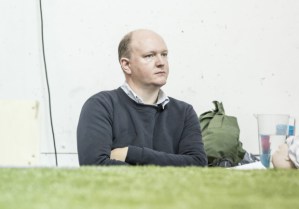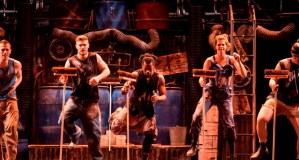There aren’t many gardens in theatre and when they appear they nearly always, in some way or another, represent England. So it is here. In Albion (the clue’s in the title), an oak tree overhangs a desolate patch of land, where in time, and in front of our eyes, plants bloom, grow and die and suggest all kinds of things about the country in which we live and the people we are.
Miriam Buether’s earthy set, with its real plants and real rain, is integral to Mike Bartlett’s new play, which marks his most recent return to the Almeida after the worldwide success of King Charles III and the gripping TV series Doctor Foster.
It represents Albion, a country house with a garden that was once "the model for all English gardens" built by the imaginary garden designer Weatherbury who returns from the First World War determined to memorialise his comrades who have died. We glimpse him at the very start of the action, sitting under the oak in his uniform as Elgar’s music swells around him.
But the focus is now on Audrey Walters (Victoria Hamilton), a shrewd successful business woman who has bought the manor house in order to restore the garden to its former glory – which she remembers from her own childhood. She brings with her a disaffected daughter, a doting husband and a novelist friend – and all kinds of baggage.
Her acerbic impact on village life is like a dose of weedkiller. The old retainer in the form cleaner Cheryl (a magnificently wounded Margot Leicester) is laid off and a Polish whirlwind employed in her place. A dreamy local youth Gabriel (Luke Thallon, touchingly lost) is employed to help the old gardener (Christopher Fairbank), his dreams of writing simultaneously encouraged and dashed by the incomers. The locals are offended by Audrey’s belief that the garden is hers, a private sanctuary not a public place.
Most of all, Audrey finds herself in conflict with her dead son James’ ex-girlfriend Anna. He was an army captain, killed by a roadside bomb, and their different beliefs about who he was and what he stood for are brought into sharp focus by a terrible act through which Audrey hopes to keep her son’s memory all for herself.
There’s something of a Greek tragedy in the primal forces that are unleashed and the garden increasingly becomes a metaphor for varying things: for control over chaos, for nurture over nature, for life over death. Audrey’s determination to impose her will on her surroundings and her family springs as much from debilitating grief as from instinctive control-freakery.
It’s a great, baggy play that could probably (at more than three hours) do with a little pruning. But better something with too many ideas than too few. Even though the scene remains the same, it has its own richness of texture.
As in Doctor Foster, Bartlett reveals an ability to create a surging family saga, full of big emotions and high feelings. These people aren’t exactly real – they are too extreme for that – but out of the melodrama a kind of power emerges. He keeps the tone funny, even as the mood turns dark, which is a rare skill. The image of Paul lighting Audrey’s birthday cake as her dream collapses will stay with me for a long time.
In Rupert Goold’s beautifully judged and characteristically propulsive production, the entire ensemble is superb with Nicholas Rowe making more of the meek bored husband than you would believe was possible, Charlotte Hope and Vinette Robinson finding the precise beats of the daughter and the would-be daughter-in-law’s despair, and Helen Schlesinger bringing both resignation and pain to the role of the misunderstood friend.
As for Hamilton, she commands the stage and the play, creator and destroyer, monster and magnificent matriarch. One of Bartlett’s gifts was bringing her to wider public attention as the neighbour in Doctor Foster. Here, as there, all her ability for communicating every nuance of a complex character is on display in the smallest of gestures, the tightening of a muscle, the plucking of a leaf from the ground. You admire Audrey and you hate her; you certainly understand her.
Albion runs at the Almeida Theatre until 24 November.















